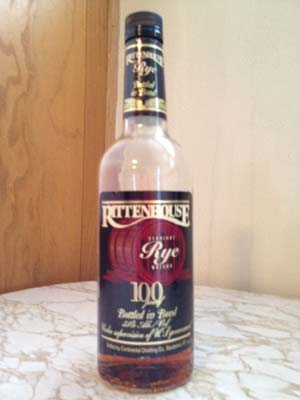Rittenhouse Straight Rye Whisky Review
Rittenhouse Rye Whisky is my first rye whisky review and also happened to be the first rye whisky that I tasted about 6 years ago. It also is, in my opinion, one of the best and a serious bargain at retail $17 – $22 a bottle! It was 6 years ago that I asked a liquor manager at a local store (that I respected very much) for a good 1st rye whisky to try. He suggested Rittenhouse and I was willing to give it a go but my first impression was “It has a screw cap?!” It did not take very long to have my “fear of the cap” assauged as I found this to be a very delightful and suprising whisky! It retails for between $17 – $22.
Rittenhouse Rye is owned and produced by Heaven Hill Distilleries. Heaven Hill is a private family-owned and operated distillery company headquartered in Bardstown, Kentucky that produces and markets the Heaven Hill brand of Kentucky Straight Bourbon Whiskey and a variety of other distilled spirits. Its current distillery facility, called the Heaven Hill Bernheim distillery, is in Louisville, Kentucky. It is the seventh-largest alcohol supplier in the United States, the second-largest holder of bourbon whiskey in the world, the only remaining family-owned distillery in Kentucky (not counting the Brown-Forman Corporation, which is publicly traded but more than two-thirds family-controlled), and the largest independent family-owned and operated producer and marketer of distilled spirits in the United States.
Heaven Hill was founded shortly after the repeal of Prohibition in 1935 by several investors, including a prominent distiller, Joseph L. Beam, and a member of the Shapira family. As the company developed, the five brothers of the Shapira family bought out the other investors. Joe Beam remained as Master Distiller, along with his youngest son, Harry. Descendants of the Shapira brothers own and run the company to this day.
All of the Master Distillers at Heaven Hill since its founding have been members of the Beam family. The original Master Distiller was Joseph L. Beam, Jim Beam’s first cousin. He was followed by his son, Harry, who was followed by Earl Beam, the son of Jim Beam’s brother, Park. Earl Beam was succeeded by the current Master Distillers, Parker Beam and his son, Craig Beam.
The original name was “Old Heavenhill Springs” distillery. The company was founded as a bourbon distillery, and for most of its existence has concentrated on its flagship bourbon labels, Evan Williams and Elijah Craig. However, in the past two decades the company has expanded its portfolio significantly, acquiring brands or obtaining import rights for gins, malt whiskey, vodkas, and other drinks.
On November 7, 1996, Heaven Hill’s production plant was almost completely destroyed by fire. Several of the company’s warehouses were destroyed, and over 90,000 gallons of alcohol were lost. The company survived the next several years through the provision of production capacity by its fellow local bourbon labels, Brown-Forman and Jim Beam, until its purchase and adaptation of the new Heaven Hill Bernheim distillery in Louisville, while fermenting, mashing, and distilling occurs at the new distillery, aging, bottling, and shipping still occur in Bardstown.
With the 2003 acquisition of distribution rights to Hpnotiq, Heaven Hill greatly expanded their product base beyond bourbon. Hpnotiq is now the fourth highest selling imported liqueur in the US. While bourbon is still their main focus, Heaven Hill now distributes a wide variety of different products.
The Heaven Hill company strongly emphasizes the history and traditions of bourbon in its public relations, highlighting the company’s location in the historical home of bourbon-making and its status as the only such company still under local ownership. In 2004, a Bourbon Heritage Center was opened on the old distillery grounds, featuring historical exhibits and guided tours of the plant. The company also hosts the annual Kentucky Bourbon Festival, and several of the company’s brands are named after famous local distillers.

Produced in the tradition of the classic Pennsylvania (or “Monongahela” rye whiskeys) RIttenhouse (The last remaining Pennsylvania rye on the market), is a much acclaimed rye now enjoying a comeback throughout the country as today’s sophisticated American whiskey consumer re-discovers classic whiskey styles. MononGahela rye’s name comes from the Monongahela which is a river in western Pennsylvania named after a Latinized version of the Native American word Mechmenawungihilla. The word means “falling banks” in reference to the geological instability of the river’s banks, which are high, get washed out and therefore collapse. This region was the site of America’s first civil war, the Whiskey rebellion of 1794. It later became the epicenter of American distilling when whiskey production boomed in the 1800’s. Monongahela whiskey was considered so marvelous that it became the standard spirit of the young nation. Of the 2500 known stills in American, most were in this area; in 1810, Kentucky produced 2.2 million gallons of whiskey from primarily corn, Pennsylvania produced 6.5 million gallons of mostly Monongahela rye. Historians think the world began expect that whiskey should be barrel aged because it took longer for Monongahela rye to get to its markets on the East coast.
Likewise, the Rittenhouse brand is beloved by mixologists for its robust style and enjoys a renaissance as cocktails regain popularity. It has been written that Rittenhouse’s demand is quickly outstripping it’s supply because “it tastes like whisky that costs twice as much”. There is one other big reason for the shortage of Rittenhouse… since Rittenhouse 100 is a Bottled-In-Bond straight rye whiskey, there are certain guidelines that the distillery must follow. One of them is a minimum age requirement. Rittenhouse, to not only meet the “BIB” guideline, but also maintain its flavor profile, is aged about 6-8 years in a new, charred white oak barrel.
Available in the standard 80° bottling or in a special Bottled-In-Bond 100° expression, Rittenhouse is produced in the tradition of the classic rye whiskeys that were once the preeminent American whiskey style, kept alive through the lean years by Heaven Hill and two other distilleries.
And so my review:
It has a nice relatively rich color. It just seems more deep amber than many bourbons and not in a caramel coloring sort of way (although I do not know if it has coloring added.. can’t find anything on that.. to be honest my guess is that it does but if it does it works better here than in many offerings). It’s color portrays pretty well from the pour what is true of the nose, the taste and the finish… bold, rich, masculine and not overly complex.
Nose: Bold and inviting. Suprisingly little heat for a 100 proof whisky. Roasted almonds, sea salt, chestnuts, freshly produced dark leather, dark honey (difficult to discern which type because it is very subdued), freshly struck match and stewed apricots. There is an element of the nose that reminds me of the ocean air.
Taste: A sweet and rather creamy gently cloying mouthfeel.The heat starts to announce itself in a relaxed and gentle (yet definite) way at the very front of the tongue. Burnt very dark caramel, marzipan, white pepper and even a bit of ginger root. Not a massive collection of unique flavors but each played out boldy and well defined. Very rich, sweet and somewhat thick and long finish with notes of the caramel and apricots. The heat doesn’t roar at you at the end, in fact it finishes quite relaxed for such a bold and relatively high proof whisky.
Balance: I must say it is quite balanced indeed. From color to nose to finish it makes no apologies and no compromises either. It suprises you with it’s level of finesse at its price point and stays bold and true as you work through it.
Overall, I did 6 years ago and do now seriously like this rye whisky. Actually I will say that I like it more now than I did back then. Which brings up the point that “rye” whisky has become quite the fashion as of late and there are many more to choose from then say 5 – 10 years ago… let me be blunt.. there are many quite bad rye whisky’s on the market. Many ranging from bland to downright rubbish. While I was very meticulous in this review (as I am in all of my reviews.. it is my duty I feel) I found elements in the glass that I hadn’t before. It is very bold in most respects while making sure that you “get” what it is trying to get across… yet does it in a way that allows you to relax and piece together the chapters that it has. It is not a slap in the face.. it is a gentle yet awakening caress to the cheek that alerts you to its presence and at the same time allows you to “drink it in”.
One last thing to add is that while (very impressively) the 100 proof never really announces itself as strongly as one might imagine a 100 proof whisky to… it tends to consistently “work” as strongly and relatively quickly as one would think a 100 proof whisky would! One legitimate glass of Rittenhouse Rye Whisky and one starts to feel a bit “drambunctious”!!
A great whisky does not always have a cork!
And does not always have to cost more than around $20!
Score: 9 Black Cats (out of 10)
We are all warriors and we need to celebrate,
Cheers!
Chris



